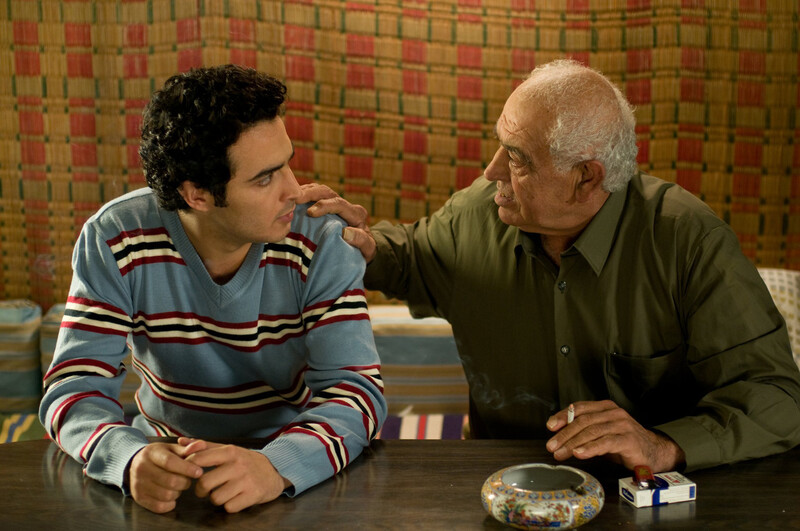The Electronic Intifada 10 May 2012

Razi Shawahdeh and Bassem Loulou in Man Without a Cell Phone.
The under-recognized steadfastness of Palestinians who clung onto their land in the areas of Palestine upon which the State of Israel was declared is lovingly praised in Sameh Zoabi’s lighthearted debut feature Man Without a Cell Phone.
Man Without a Cell Phone was a selection of the 11th annual Chicago Palestine Film Festival which took place last month, and will be screened this Saturday at the Houston Palestine Film Festival. It is also one of only a few recent feel-good Palestinian films that I can think of (Cherien Dabis’s Amreeka comes to mind).
The main protagonist of Zoabi’s film is Jawdat (Razi Shawahdeh), a young man whose charms with women go further than is good for him. Where Jawdat has had success in finding multiple girlfriends (relationships maintained via cell phone, which eventually go awry) he lacks ambition in all other areas of his life. Repeatedly failing the Hebrew language requirement for a nearby Israeli university, Jawdat is engrossed in his cell phone at the family dinner table and uninterested in helping his father tend to their olive orchard, next to which an enormous cell phone antenna has been installed by the Israeli government.
War on antenna
Jawdat’s father, Salem (Bassem Loulou), declares war on the antenna, believing it to be causing cancer in the town, Iksal, and killing his neighbor’s bees. The escalating struggle against the tower drives the plot of the film, and in doing so, is a vehicle to show Israel’s racist system which is intended to drive Palestinian citizens from their land.
The antenna becomes a character in itself once a security camera is installed on it. The audience sees Jawdat, Salem and their community through Israel’s eyes as objects of monitoring — an existential security threat — as Zoabi comically cuts to black-and-white footage of the camera following the characters’ movements.
Meanwhile, Jawdat’s seemingly perpetual adolescence is linked to the system which “doesn’t want him educated,” as he is told more than once in the film.
Jawdat reclaims his manhood once he joins his father’s resistance against the cell phone tower, joining Salem and other town elders around a table as they draft a petition to have the antenna removed. Jawdat takes their draft petition and invigorates it with nationalist rhetoric, putting it into the context of the wider repression of Palestinians in Israel.
The group canvasses the town (where “no one’s been taught to stand up for their rights,” Salem says) for signatures, and proudly present their petition to their town councilor — only to find that he serves as a Palestinian gatekeeper to the Israeli government. It is an unflattering commentary on the role played by Palestinian citizens who go along with the system at the expense of their community’s rights. But as Salem tells Jawdat later on in the film (I won’t spoil the ending for the reader), “They have won the battle, but we will win the war” — this single line poignantly summarizing the experience of Palestinians in Israel who have been under constant attack since the Zionist state was established in 1948, yet still remain.
Absurdist tradition
Zoabi’s film fits into the absurdist tradition of Palestinian filmmaking — perhaps only absurdism can begin to make sense of the monumental injustice thrust upon the Palestinian people — but does so in its own way. Zoabi’s first feature film may not boast the same mastery as Elia Suleiman’s films, but it is far kinder to the elder generation of Palestinians in Israel than are Suleiman’s earlier works. Man Without a Cell Phone also showcases fine and funny performances from unknown actors, particularly Bassem Loulou as the curmudgeonly father.
It is to Zoabi’s credit that he has found a novel way to tell Palestine’s story of colonization and oppression by Israel that doesn’t pound the viewer on the head, and may likely be equally appreciated by an audience of Palestinians in Haifa as would be by an audience in Chicago.
Zoabi’s sweet story is a welcome addition to the remarkable breadth of Palestinian filmmaking which makes events like the Chicago and Houston Palestine film festivals well worth returning to year after year.
Maureen Clare Murphy is managing editor of The Electronic Intifada.



